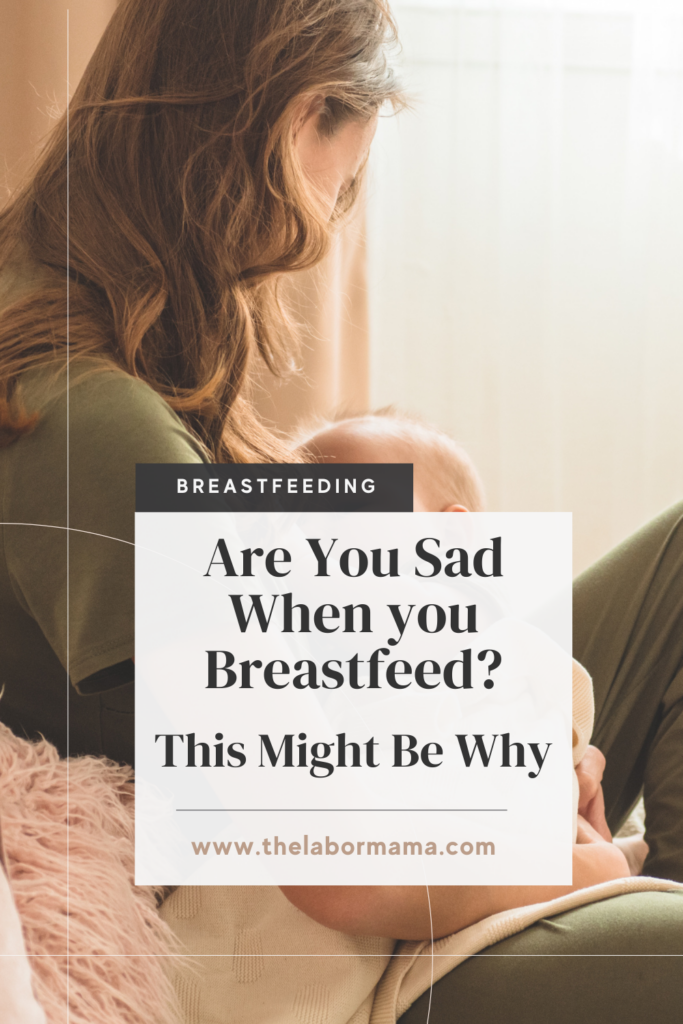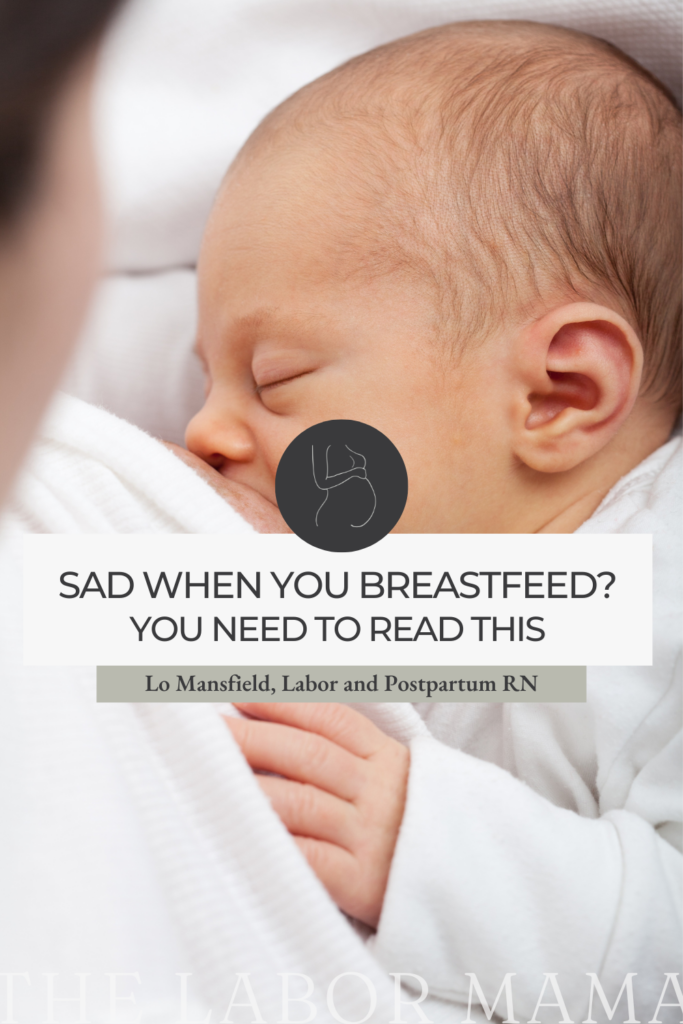As a labor and delivery nurse, I have spent countless hours championing mamas in their desires to breastfeed, assisting with that first latch, setting up pumps for the first time, and teaching hand expression to wide-eyed and exhausted parents. Most of the time, we got that tiny baby latched, and I’d get the sweet privilege of watching that mama’s eyes light up as she realized that maybe, just maybe, breastfeeding was going to work out.

Who is The Labor Mama and Why Am I Here?
Hey friend! I’m Lo – also known around here and social media as The Labor Mama. I’ve spent my nursing career in labor, delivery, and postpartum, have birthed 4 of my own babies, have labored thousands of mamas at the bedside, have taught hundreds of students online, and have even delivered a few speedy little babies with my bare hands (oops).
Here at TLM, I offer online classes to empower you the way everyone should be. The education + support I offer gives you experience, evidence, and empathy; you’re getting all of my years of “clinical” RN knowledge, beautifully combined with my real experiences as a mama and a nurse. These are not your average hospital classes (those won’t do it, I promise), and honestly, birth, postpartum, and breastfeeding don’t follow a textbook or protocol anyway. You need to know so much more than that!
If you want to connect with me further, head to Instagram. There are hundreds of thousands of us over there learning together daily.
A note: This post may include affiliate links. This means if you make a purchase after clicking a link, I will earn a small commission (thank you)! Rest assured, this comes at no additional cost to you. You can read TLM’s full disclosure here.
My personal breastfeeding and D-MER story
Listen to my whole D-MER story in Episode 04 of Lo & Behold.
With my first daughter, I found the nuances of breastfeeding relatively easy. Of course, there were many aches and pains, significant learning curves, and countless nights wondering if my baby was crying because she was hungry or crying because she was a baby. But we figured it out together and I got to spend a year sharing that time and space with her.
When my second daughter was born, I assumed our breastfeeding journey would be similar. But at four weeks postpartum and exhausted with two under two, I can remember my husbands’ words so clearly, “It just seems like you hate breastfeeding.” I was so mad at him for voicing that out loud, for being willing to acknowledge the very really possibility that I didn’t love something that everyone says you’re supposed to love. And I was confused too, so confused. I was a specialty certified labor nurse. I had breastfed my first for 13 months with no issues. I had championed so many mamas on their own journey. Why did I have no idea what was wrong with me?

Why I didn’t like breastfeeding
My husband wasn’t wrong. The second time around, I didn’t like breastfeeding because I didn’t like the way it made me feel. I was overcome with sadness every time I nursed, constantly fighting back tears. As quick as the feelings came on, they were gone, only to return the next time I fed her. The emotional roller coaster left me feeling guilty, ashamed and confused, and ultimately, like a bad mother.
I had dysphoric milk ejection reflex (D-MER) with my second daughter.
What is D-MER?
D-MER stands for dysphoric milk ejection reflex. It is a physiological condition affecting some lactating women characterized by the abrupt onset of negative emotions (dysphoria) just before milk let down and continuing for no more than a few minutes. Though some awareness and education related to the condition started showing up in the postpartum community about 12 years ago, there are still many women who suffer with D-MER and have no idea what is going on.
Is this you mama? Or maybe a friend? There are some things you need to know.
Helpful related reading:
Dysphoric Milk Ejection Reflex: Understanding D-MER
6 things to know about D-MER
1. D-MER is not a postpartum mood disorder.
During my own research, I was concerned that I was ignoring the signs of postpartum depression or anxiety. D-MER is not a part of either of those psychological conditions, but it can be harder to treat if a mama is suffering with one of them as well.
2. D-MER is a reflexive action in your body.
D-MER is a physiological condition related to an inappropriate drop in dopamine that happens during milk release. When you tell someone what is going on, their natural inclination may be to tell you to “think happy thoughts” (i.e. – avoid it). You cannot do this mama. The negative emotions are a result of a hormonal shift and you cannot control it or stop it.
3. D-MER is not nausea, impatience, irritability or aversion to breastfeeding.
Many mamas struggle with some of these feelings related to the age of the nursling, nipple issues, weaning, or nursing while pregnant. D-MER is always classified by its negative emotional component.
4. D-MER looks different in different mamas.
All too often, our tendency as mamas is to compare experiences in order to determine what is going on. While this can be helpful at times, know that there is a spectrum of intensity and emotions related to D-MER (mild to severe), as well as different experiences related to non-nursing situations like pumping or spontaneous let down.
5. D-MER needs to be talked about by providers and taught about in the postpartum community.
Whether you’re a first time mama or a fourth time mama, bring D-MER up in a prenatal or postpartum appointment. There is no known predisposition or cause for it, but if you’ve potentially suffered with it in the past, or are currently, education shows that you will likely experience it in some form with future babies.
6. Education, lifestyle changes, natural remedies, and/or medication may be able to alleviate some of the symptoms of D-MER.
If D-MER is making breastfeeding too hard or leading you to consider weaning earlier than you want, please talk to your provider about things you can potentially try first. It is possible there are things in your life you could eliminate or add that may help lessen the severity of your symptoms.
Listen – breastfeeding is as hard as it is beautiful – and D-MER might be part of that. Don’t go into this blind. Get inside of The Breastfeeding Blueprint, where you and I will walk through breastfeeding prep, the first hours, and days, and weeks (and months!!). Be ready for the challenges and the complications before they ever show up – because they will, but you can do this.
The take away on D-MER
If you think you (or a friend) may be suffering with D-MER, know this. You don’t hate breastfeeding; you hate how it makes you feel. You are not alone. You are not sick. And you are not a bad mama. If you want help, it’s out there. Please ask. And if you need to be done nursing, that’s okay too. Whatever choices you need to make, whatever road D-MER leads or led you down, you are a very good mama.
A note: D-MER.ORG is my favorite source for information related to this condition. I recommend checking them out first when you begin any of your own research. If you’d like to hear more of my own stories, please visit the PUSH Revolution podcast Episode 52 HERE.
Have you struggled with D-MER? Or did you not know at the time, and now you think you may have? Let me know in the comments. xx- Lo

More resources (and freebies!) for you to take a peek at:




